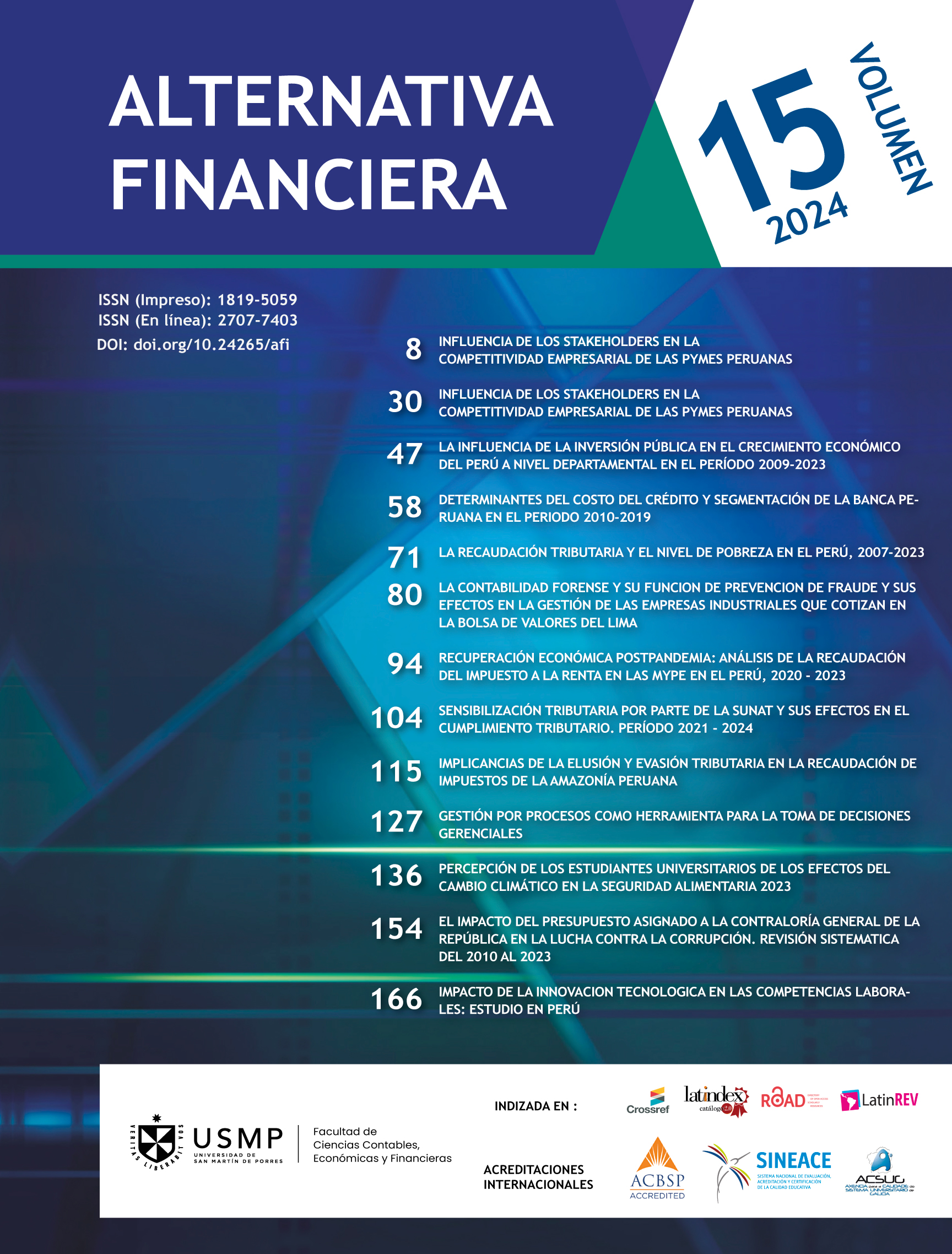IMPLICATIONS OF TAX AVOIDANCE AND EVASION ON TAX COLLECTION IN THE PERUVIAN AMAZON
Keywords:
elusión, evasión tributaria, recaudación de impuestoAbstract
The Peruvian tax system has implemented a series of benefits, exemptions, and exclusions with the aim of alleviating the tax burden and stimulating investment. However, the impact of these incentives on tax collection and economic development requires detailed evaluation. This study focuses on the Amazon Region, an area with characteristics such as high economic informality, tax evasion, and avoidance, which affect both tax collection and socioeconomic development. Law No. 27037, created to encourage investment in the Amazon, has shown mixed results and has led to a reevaluation of its effectiveness and the possibility of its elimination.
The research adopted a qualitative approach combined with a descriptive analysis of public data. A non-experimental correlational design was used to observe the relationship between tax evasion and avoidance variables without directly intervening in the study environment. The methodology included the collection and analysis of tax data from the region, as well as a review of previous studies and relevant legislative documents. Preliminary findings reveal that tax incentives in the Amazon have not achieved the expected results. The tax evasion rate in some areas of the region reaches up to 80%, while 2018 data indicate a general evasion rate of 19%. These figures suggest a significant disconnect between
the granted fiscal benefits and the actual impact on tax collection. The experience in San Martín, where certain tax benefits were removed, shows an improvement in collection and could offer a replicable model for other regions.
High tax evasion and the prevalence of the informal economy severely limit the government’s ability to raise funds and finance essential public services. Despite the tax incentives, poverty in the region has increased, questioning the effectiveness of the implemented policies. It is observed that economic informality and the lack of effective control mechanisms significantly contribute to the problems of tax evasion.
The research suggests that a thorough review of the tax policies applicable to the Amazon Region is required. It is essential to strengthen fiscal control mechanisms and improve oversight of tax incentives to enhance compliance. Additionally, a review and adjustment of tax benefits are recommended to ensure they are effective in promoting economic development and reducing poverty. Strengthening the institutions responsible for oversight and promoting tax education
are crucial steps to address the challenges of tax evasion and avoidance in the region and to foster more equitable and sustainable economic development.
KEYWORDS: Avoidance, tax evasion, tax collection.
Downloads
References
Aguilar Maluquis, M. (2021). Evasión tributaria y su impacto en la recaudación de los comerciantes de abarrotes - Mercado Santa Celia - Cutervo - 2018. Tesis para obtener el Título profesional de contabilidad, Universidad Señor de Sipan, Pimentel. Recuperado el 18 de junio de 2024 de: https://repositorio.uss.edu.pe/bitstream/handle/20.500.12802/7910/Aguilar%20Maluquis%20Mirian.pdf?sequence=1&isAllowed=y
Armendariz, R. (2012). ¿De dónde salió la plata? Revistas USIL, 1.
Banco Central de Reserva del Perú. (2017). Reporte de Inflación. Recuperado el 25 de Mayo de 2024, de https://www.bcrp.gob.pe/docs/Publicaciones/Reporte-Inflacion/2017/setiembre/ri-setiembre-2017-recuadro-1.pdf
Bird, R. M., & Zolt, E. M. (2014). Tax Policy in Developing Countries: What Do We Know? In Taxation and Development: The Weakest Link? Edward Elgar Publishing
Bustamante, M. (2020). Estrategias tributarias para mejorar la recaudación de impuestos en la Municipalidad Distrital de Picsi. Chiclayo: UPG Universidad Cesar Vallejo. Obtenido de https://hdl.handle.net/20.500.12692/45861
Castro, A. (22 de agosto de 2021). La Amazonía del bicentenario: entre la explotación y la amenaza del punto de no retorno. (O. Público, Ed.) Ojo Público. Obtenido de https://ojopublico.com/2930/entre-la-explotacion-y-elpunto-no-retorno-la-amazonia
César, B. (2010). Metodología de la investigación (Vol. 3). Colombia: Pearson educación. Obtenido de: https://abacoenred.org/wpcontent/uploads/2019/02/El-proyecto-deinvestigaci%C3%B3n-F.G.-Arias-2012-pdf.p
Comexperú. (23 de 02 de 2024). Comexperú. Obtenido de Comexperú: https://www.comexperu.org.pe/articulo/ingresostributarios-se-redujeron-un-67-en-2023-persiste-riesgo-de-incumplimiento-de-laregla-fiscal-2024#:~:text=En%202021%2C%20el%20Ministerio%20de,representaron%20 un%208%25%20del%20PBI
Defensoría del Pueblo. (s.f.). Un país sin corrupción. Recuperado el 29 de mayo de 2024, de: https://www.defensoria.gob.pe/areas_tematicas/un-pais-sin-corrupcion/
Espinoza, O. (22 de setiembre de 2022). Amazonía: actividades económicas ilícitas y su incremento durante los años de la pandemia. Revista Jesuita de Cultura Social, intercambio(59). Recuperado el 26 de mayo de 2024, de: https://
intercambio.pe/amazonia-actividadeseconomicas-ilicitas-y-su-incremento-durantelos-anos-de-la-pandemia/
Feld, L. P., & Frey, B. S. (2002). Trust Breeds Trust: How Taxpayers Are Treated. Economics of Governance.
Grupo de Justicia Fiscal Perú. (Julio de 2019). EVASIÓN Y ELUSIÓN TRIBUTARIA. Recuperado el 23 de mayo de 2024, de chrome-extension://efaidnbmnnnibpcajpcglclefindmkaj/https://propuestaciudadana.org.pe/wp-content/uploads/2019/07/HojaInformativa-Evasion-tributaria.pd
Grupo de Justicia Fiscal Perú. (Julio del 2019). EVASIÓN Y ELUSIÓN TRIBUTARIA. CAUSA Y EFECTO DE LA INJUSTICIA FISCAL(03). Recuperado el 25 de JUNIO de 2024, de: https://oi-filescng-prod.s3.amazonaws.com/peru.oxfam. org/s3fs-public/file_attachments/Hoja%20Informativa%20Evasion%20tributaria.pdf.
López, R., & Ramírez, M. (2019). Fiscal Policy and Development: Evidence from Latin America. Cambridge University Press
López-Cálix, J. R., & Meló, A. (2004). A más disciplina fiscal, menos pobreza. (G. Giannoni, Ed.) Washington DC, Estados
Unidos de América: Banco Interamericano de Desarrollo. Recuperado el 29 de mayo de 2024, de chrome-extension://
efaidnbmnnnibpcajpcglclefindmkaj/https://webimages.iadb.org/publications/spanish/document/A-m%C3%A1s-disciplinafiscal-menos-pobreza-Revisi%C3%B3n-delgasto-p%C3%BAblico-en-Per%C3%BA.pdf
Piketty, T. (2014). Capital in the Twenty-First Century. Harvard University Press
Organización para la Cooperación y el Desarrollo Económicos. (s.f.). Programa País OCDE-Perú. Resumen ejecutivo, OCDE. Recuperado el 28 de mayo de 2024, de chrome-extension://efaidnbmnnnibpcajpcglclefindmkaj/https://
www.oecd.org/latin-america/countries/peru/Compilation_Executive_Summaries_ P_Peru_WEB_version_with_ covers_ESP.pdf
Reátegui, M. A. (2016). Importancia de la cultura tributaria en el perú. Accounting power for business, 1(1), 73-90. Obtenido de: https://revistas.upeu.edu.pe/index.php/ri_apfb/article/view/898#:~:text=La
Schneider, F. (2005). Shadow Economies around the World: What Do We Really Know? European Journal of Political Economy.
Slemrod, J., & Bakija, J. (2008). Taxing Ourselves: A Citizen’s Guide to the Debate over Taxes. MIT Press.
SUNAT. (08 de diciembre de 2020). Cultura tributaria para un Perú más justo y solidario. (L. E. Vera, Editor) Recuperado el 29 de mayo de 2024, de: https://cultura.sunat.gob.pe/noticias/cultura-tributaria-para-un-peru-mas-justo-y-solidario
Superintencia Nacional de Administración Tributaria. s.f.). 01. La Norma Antielusiva General – NAG.
Recuperado el 26 de mayo de 2024, de https://orientacion.sunat.gob.pe/7299-01-la-norma-antielusiva-general-nag-empresas.
Tanzi, V., & Davoodi, H. (2000). Corruption, Growth, and Public Finances. IMF Working Paper
The World Bank. (05 de abril de 2024). El Banco Mundial en Perú. Recuperado el 28 de mayo de 2024, de Visión General: https://www.worldbank.org/en/country/peru/overview
Transparency International. (2019). CORRUPTION PERCEPTIONS INDEX. Recuperado el 29 de mayo de 2024, de https://www.transparency.org/en/cpi/2019
Wei, S. J. (2000). How Taxing is Corruption on International Investors? Review of Economics and Statistics
Downloads
Published
Issue
Section
License
Copyright (c) 2024 Luis Huaytan Tucto, Miker Cupe Chalco

This work is licensed under a Creative Commons Attribution-NonCommercial-ShareAlike 4.0 International License.
Creative Commons Atribución-NoComercial-CompartirIgual 4.0 Internacional (CC BY-NC-SA 4.0). Faculta a los usuarios a compartir: copiar y redistribuir el material en cualquier medio o formato y adaptar: remezclar, transformar y desarrollar el material, siempre y cuando se acredite al autor original, no se utilice con propósitos comerciales y las nuevas creaciones se licencien bajo los mismos términos de esta licencia.













